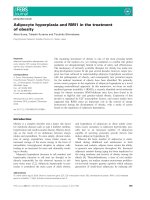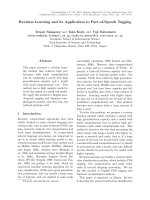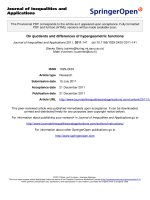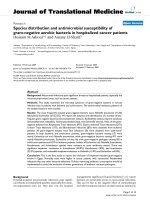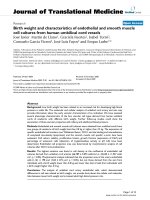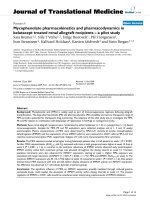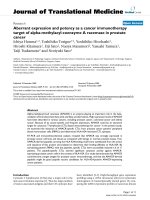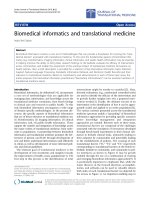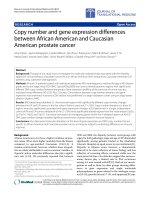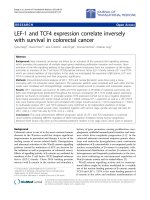báo cáo hóa học: " Funding free and universal access to Journal of Neuroinflammation" doc
Bạn đang xem bản rút gọn của tài liệu. Xem và tải ngay bản đầy đủ của tài liệu tại đây (200.29 KB, 3 trang )
BioMed Central
Page 1 of 3
(page number not for citation purposes)
Journal of Neuroinflammation
Open Access
Editorial
Funding free and universal access to Journal of Neuroinflammation
Robert E Mrak*
1
and W Sue T Griffin
2
Address:
1
Department of Pathology, University of Arkansas for Medical Sciences, Little Rock, Arkansas, USA and
2
Department of Geriatrics,
University of Arkansas for Medical Sciences, Little Rock, Arkansas, USA
Email: Robert E Mrak* - ; W Sue T Griffin -
* Corresponding author
Abstract
Journal of Neuroinflammation is an Open Access, online journal published by BioMed Central. Open
Access publishing provides instant and universal availability of published work to any potential
reader, worldwide, completely free of subscriptions, passwords, and charges. Further, authors
retain copyright for their work, facilitating its dissemination. Open Access publishing is made
possible by article-processing charges assessed "on the front end" to authors, their institutions, or
their funding agencies. Beginning November 1, 2004, the Journal of Neuroinflammation will introduce
article-processing charges of around US$525 for accepted articles. This charge will be waived for
authors from institutions that are BioMed Central members, and in additional cases for reasons of
genuine financial hardship. These article-processing charges pay for an electronic submission
process that facilitates efficient and thorough peer review, for publication costs involved in
providing the article freely and universally accessible in various formats online, and for the
processes required for the article's inclusion in PubMed and its archiving in PubMed Central, e-
Depot, Potsdam and INIST. There is no remuneration of any kind provided to the Editors-in-Chief,
to any members of the Editorial Board, or to peer reviewers; all of whose work is entirely
voluntary. Our article-processing charge is less than charges frequently levied by traditional
journals: the Journal of Neuroinflammation does not levy any additional page or color charges on top
of this fee, and there are no reprint costs as publication-quality pdf files are provided, free, for
distribution in lieu of reprints. Our article-processing charge will enable full, immediate, and
continued Open Access for all work published in Journal of Neuroinflammation. The benefits from
such Open Access will accrue to readers, through unrestricted access; to authors, through the
widest possible dissemination of their work; and to science and society in general, through
facilitation of information availability and scientific advancement.
Introduction
Journal of Neuroinflammation is an Open Access, online
journal that is published by BioMed Central, an inde-
pendent publisher committed to Open Access for peer-
reviewed biomedical research [1]. Among the many bene-
fits of Open Access publishing are (1) instant and univer-
sal availability of published work to any potential reader,
worldwide, completely free of subscriptions, passwords,
and charges; and (2) copyright retention by the authors
rather than the publisher. This and many other benefits
led us to select Open Access publishing, and to select Bio-
Med Central, for the Journal of Neuroinflammation. Open
Access publishing is made possible by article-processing
charges (APCs) assessed "on the front end" to authors,
Published: 14 October 2004
Journal of Neuroinflammation 2004, 1:19 doi:10.1186/1742-2094-1-19
Received: 12 October 2004
Accepted: 14 October 2004
This article is available from: />© 2004 Mrak and Griffin; licensee BioMed Central Ltd.
This is an open-access article distributed under the terms of the Creative Commons Attribution License ( />),
which permits unrestricted use, distribution, and reproduction in any medium, provided the original work is properly cited.
Journal of Neuroinflammation 2004, 1:19 />Page 2 of 3
(page number not for citation purposes)
their institutions, or their funding agencies. The Journal of
Neuroinflammation will introduce APCs of around US$525
per article for manuscripts submitted on or after Novem-
ber 1, 2004. This charge will be waived for all authors
from institutions that are BioMed Central members, and
in additional cases for reasons of genuine financial hard-
ship.
Problems with the traditional publishing model
Traditional journals generally do not charge authors for
publication (although assessed page or color charges may
easily exceed our APCs). Instead, article access is tradition-
ally paid for by readers, either through subscriptions or
through fees assessed for online viewing and download-
ing. Over the past decade, escalating journal subscriptions
have resulted in cash-strapped libraries cancelling journal
subscriptions [2], thus limiting the range of articles avail-
able to many readers and limiting the potential audience
available to authors.
The Open Access publishing model
The Journal of Neuroinflammation's Open Access policy
changes the way in which articles are published. First, all
articles become freely and universally accessible online,
immediately upon acceptance, so an author's work can be
read by anyone at no cost. Second, the article authors
retain copyright for their work, and grant to anyone the
right to reproduce and disseminate the article, provided
that it is correctly cited and no errors are introduced [1].
Third, a copy of the full text of each article is permanently
archived in several separate online repositories. Journal of
Neuroinflammation's articles are permanently archived in
PubMed Central [3], the US National Library of Medi-
cine's full-text repository of life science literature, and also
in repositories at the University of Potsdam [4] in Ger-
many, at INIST [5] in France and in e-Depot [6], the
National Library of the Netherlands' digital archive of all
electronic publications.
Benefits of Open Access publishing
Open Access has four broad benefits for science and the
general public. First, published work is disseminated
freely and instantly to the widest possible audience, with-
out barriers to access. Authors are free to reproduce and
distribute their work at will, for example by placing it on
their institution's website. Open Access publication has
been shown to actually increase article citations and
impact because of this easier availability [7]. Second,
availability of Open Access articles enhances literature
searching [8], as information available to researchers is
not limited by what their libraries can afford. Third,
results of publicly funded research are accessible to all tax-
payers and not just those with access to libraries with jour-
nal subscriptions. Such public accessibility would actually
become a legal requirement in the USA if the proposed
Public Access to Science Act is enacted into law [9].
Fourth, article access is not limited by the economic
resources of a scientist's country or institution; resource-
poor countries and institutions are able to access the same
material as wealthier ones, subject only to the availability
of internet access [10].
Journal of Neuroinflammation's article-processing
charges
Article-processing charges will allow continued Open
Access to all article published in Journal of Neuroinflamma-
tion. Authors will be asked to pay around US$525 upon
acceptance of their article for publication. Submitted arti-
cles that are not accepted will incur no charge. There will
be no charges for authors from institutions that are insti-
tutional members of BioMed Central. Currently this
includes NHS England and all universities in the UK, the
US National Institutes of Health and 136 other institu-
tions and universities in the USA, the World Health
Organization, and almost 200 additional institutions in
37 other countries [11]. Potential authors who are not
associated with these institutions can avoid article-
processing charges by getting their institution to join this
list of BioMed Central institutional members. The annual
institutional membership fee covers APCs for all authors
at that institution for that year. In addition, many funding
agencies have recognized the importance of Open Access
publishing and have specified that funds from their grants
may be used directly to pay APCs [12]. Finally, APC waiv-
ers are available for cases of genuine financial hardship.
These will be considered on a case-by-case basis by the
Editors-in-Chief.
What do article-processing charges pay for?
The APC pays for an electronic submission process that
facilitates efficient and thorough peer review, for publica-
tion costs involved in providing the article freely and uni-
versally accessible in various formats online, and for the
processes required for the article's inclusion in PubMed
and its archiving in PubMed Central, e-Depot, Potsdam
and INIST. There is no remuneration of any kind provided
to the Editors-in-Chief, to any members of the editorial
board, or to peer reviewers; all of whose work is entirely
voluntary. Although some authors may consider US$525
expensive, it must be remembered that Journal of Neuroin-
flammation does not levy any additional page or color
charges on top of this fee. Because we are an online-only
journal, any number of color figures, photographs, and
'extra' pages can be included at no extra cost. Such color
and page charges, as assessed by more traditional jour-
nals, can easily exceed our flat US$525 per-article APC.
Another common expense with traditional journals is the
purchase of reprints for distribution, and the cost of these
reprints is also frequently greater than our APCs. The Jour-
Publish with Bio Med Central and every
scientist can read your work free of charge
"BioMed Central will be the most significant development for
disseminating the results of biomedical research in our lifetime."
Sir Paul Nurse, Cancer Research UK
Your research papers will be:
available free of charge to the entire biomedical community
peer reviewed and published immediately upon acceptance
cited in PubMed and archived on PubMed Central
yours — you keep the copyright
Submit your manuscript here:
/>BioMedcentral
Journal of Neuroinflammation 2004, 1:19 />Page 3 of 3
(page number not for citation purposes)
nal of Neuroinflammation provides free, publication-qual-
ity pdf files for distribution, in lieu of reprints.
Free access versus Open Access
Several traditional journals now offer free access to their
articles online, but this is different from Open Access as
defined by the Bethesda Statement [13]. First, this access
may be delayed for 6–2 months after publication. Second,
readers are not free to reproduce and/or disseminate the
work because of restrictions imposed by publishers' copy-
right policies. Even these restrictive policies do not ensure
continued free access; the British Medical Journal, for
instance, recently announced that it cannot continue to
provide free access to its website [14]. They are consider-
ing various sources of revenue, including APCs [15].
APC-funded Open Access is not unique to BioMed Central
or to the Journal of Neuroinflammation. The USA-based
Public Library of Science (PLoS) is a new, non-profit
organization that, like BioMed Central, is dedicated to
online, Open Access publishing. PLoS has started two new
Open Access journals, with APCs of US$1500 for each
accepted article [16]. PLoS has used television advertising
to promote their new journals [9], providing a high pro-
file that should raise awareness of Open Access publishing
in general. This, in turn, should encourage researchers in
all disciplines to understand and accept Open Access, and
to accept APCs as an acceptable funding method.
Conclusion
Article-processing charges will enable full, immediate,
and continued Open Access for all work published in Jour-
nal of Neuroinflammation. The benefits from such Open
Access will accrue to readers, through unrestricted access;
to authors, through the widest possible dissemination of
their work; and to science and society in general, through
facilitation of information availability and scientific
advancement. We ask for your support in this important
movement by submitting your next article to Journal of
Neuroinflammation or to another Open Access journal.
Competing interests
At Journal of Neuroinflammation, the work of the Edi-
tors-in-Chief, the Editorial Board, and of all invited out-
side peer reviewers is entirely voluntary, without tangible
remuneration of any kind. Our goal is publication of bio-
medical research of the highest quality, and our (intangi-
ble) rewards lie in the achievement of these goals.
Decisions about manuscripts are based entirely on the
quality of the work, and not on the ability of authors to
pay article-processing charges.
Abbreviations
APC = article-processing charge.
References
1. BioMed Central Open Access Charter [medcen
tral.com/info/about/charter]
2. Tamber PS: Is scholarly publishing becoming a monopoly? BMC
News and Views 2000, 1:1.
3. PubMed Central [
]
4. Potsdam [ />]
5. INIST [ />]
6. e-Depot [ />]
7. Lawrence S: Free online availability substantially increases a
paper's impact. Nature 2001, 411:521.
8. Velterop J: Should scholarly societies embrace Open Access
(or is it the kiss of death)? Learned Publishing 2003, 16:167-169.
9. Open Access law introduced [ />news/20030627/04]
10. Tan-Torres Edejer T: Disseminating health information in
developing countries: the role of the internet. BMJ 2000,
321:797-800.
11. BioMed Central Institutional Members [med
central.com/inst/]
12. Which funding agencies explicitly allow direct use of their
grants to cover article-processing charges? [http:www.human-
resources-health.com/info/faq/apc faq.asp?txt_faq_no=8]
13. Bethesda Statement on Open Access Publishing [http://
www.earlham.edu/~peters/fos/bethesda.htm]
14. Delamothe T, Smith R: Paying for bmj.com. BMJ 2003,
327:241-242.
15. Smith R: The BMJ will experiment with the 'author pays'
model (Rapid response to BMJ 2003;327:241-2). [http://
bmj.com/cgi/eletters/327/7409/241#35308].
16. Public Library of Science to launch new free-access biomed-
ical journals with $9 million grant from the Gordon and
Betty Moore Foundation [ />announce_moore.html]
